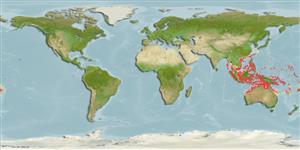>
Ovalentaria/misc (Various families in series Ovalentaria) >
Pomacentridae (Damselfishes) > Pomacentrinae
Etymology: Amblyglyphidodon: Greek, amblys = darkness + Greek, glyphis = carved + Greek, odous = teeth (Ref. 45335).
More on author: Cuvier.
Environment: milieu / climate zone / depth range / distribution range
Ecología
marino asociado a arrecife; no migratorio; rango de profundidad 0 - 60 m (Ref. 128797), usually 12 - 45 m (Ref. 9710). Tropical; 30°N - 24°S, 90°E - 174°W
Western Pacific: Andaman Sea (Ref. 7247) and Christmas Island in the eastern Indian Ocean to Fiji, north to the Ryukyu Islands, south to Rowly Shoals (eastern Indian Ocean)and New Caledonia. Recently recorded from Tonga (Ref. 53797).
Tamaño / Peso / Age
Maturity: Lm ? range ? - ? cm
Max length : 13.0 cm TL macho / no sexado; (Ref. 48636)
Short description
Claves de identificación | Morfología | Morfometría
Espinas dorsales (total) : 13; Radios blandos dorsales (total) : 12 - 16; Espinas anales: 2; Radios blandos anales: 14 - 15.
Adults occur in steep outer reef, occasionally in deep lagoons and along channel walls, usually in current prone habitats and where there are abundant gorgonian and long sea-whip corals on which they lay and guard eggs. Juveniles in small groups often found among large sea fans or black corals. Feed on zooplankton (Ref. 7247). Oviparous, distinct pairing during breeding (Ref. 205). Eggs are demersal and adhere to the substrate (Ref. 205). Eggs laid usually on gorgonian dead branches (Ref. 90102). Males guard and aerate the eggs (Ref. 205).
Life cycle and mating behavior
Maturities | Reproducción | Spawnings | Egg(s) | Fecundities | Larva
Oviparous, distinct pairing during breeding (Ref. 205). Eggs are demersal and adhere to the substrate (Ref. 205). Males guard and aerate the eggs (Ref. 205).
Allen, G.R., 1991. Damselfishes of the world. Mergus Publishers, Melle, Germany. 271 p. (Ref. 7247)
IUCN Red List Status (Ref. 130435)
Threat to humans
Harmless
Human uses
Pesquerías: comercial; Acuario: Comercial
Herramientas
Special reports
Download XML
Fuentes de Internet
Estimates based on models
Preferred temperature (Ref.
123201): 26.1 - 29, mean 28.1 °C (based on 904 cells).
Phylogenetic diversity index (Ref.
82804): PD
50 = 0.5005 [Uniqueness, from 0.5 = low to 2.0 = high].
Bayesian length-weight: a=0.02344 (0.01149 - 0.04783), b=2.99 (2.82 - 3.16), in cm total length, based on LWR estimates for this (Sub)family-body shape (Ref.
93245).
Nivel trófico (Ref.
69278): 2.7 ±0.30 se; based on food items.
Resiliencia (Ref.
120179): Alto, población duplicada en un tiempo mínimo inferior a 15 meses (Preliminary K or Fecundity.).
Fishing Vulnerability (Ref.
59153): Low vulnerability (10 of 100).
Nutrients (Ref.
124155): Calcium = 96.8 [48.8, 148.6] mg/100g; Iron = 0.72 [0.45, 1.17] mg/100g; Protein = 18.2 [17.0, 19.3] %; Omega3 = 0.116 [0.072, 0.185] g/100g; Selenium = 27.1 [15.4, 48.9] μg/100g; VitaminA = 81.4 [22.0, 272.3] μg/100g; Zinc = 1.64 [1.13, 2.35] mg/100g (wet weight);
